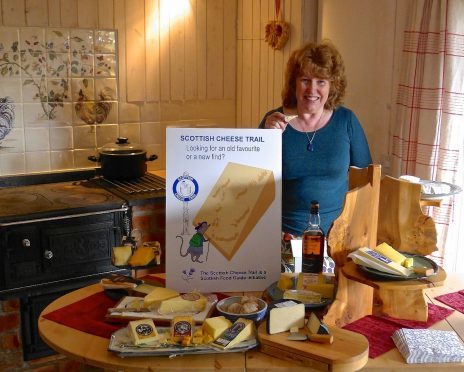Scottish dairy farmers have been told they need to start producing higher quality milk if they want to meet the demands of a burgeoning number of artisan cheese makers.
Wendy Barrie, the founder of the Scottish Cheese Trail and the owner of the Food Studio at Aberdour, said yesterday that too much of the milk produced in the UK was no better than “white water”.
Ms Barrie, one of Scotland’s top food show presenters and a regular demonstrator at the Royal Highland Show, said farmers would be better off reducing the size of their herds and improving the quality of their milk.
“It needs a complete mind set change,” she said.
“I get frustrated by the enormous dairy herds and the emphasis on producing volume. Massive farms need heavy equipment and high maintenance but smaller units bring more biodiversity. Farmers could realise more value by having a mix of breeds in their herds, including Ayrshires and Jerseys.
“There are some very good cheeses made locally with milk from old family herds of Holstein Friesians, but the artisan cheese market is growing and we could have so many more. We just need to get the right quality of milk from farms.”
Ms Barrie is a long-time advocate of locally sourced food, and keen to see the market grow for Scottish dairy produce.
“The Scottish cheese market is already growing,” she said.
“We saw a new cheese launched seven days ago and another two will be on stream within the next two months. A further six or so producers are working on cheeses which haven’t yet come to market. We are seeing a real growth in sustainable, environmentally friendly, local produce and it’s not just a middle class thing. I see plenty people at farmers markets in their twenties and thirties who’re prepared to pay a bit more to get a small portion with great flavour rather than a big chunk of industrially produced cheese which is tasteless.”
NFU Scotland’s dairy policy manager, George Jamieson said the move to producing milk with higher levels of protein, fat and lactose had already started.
“Cheesemakers want more protein but historically dairy farmers producing for the liquid market in the UK have been paid on volume so they haven’t needed high fat or protein, and higher yielding cattle tend to produce a lower percentage of fat,” he said.
“Now payments are moving towards rewarding higher protein and fat.”
Meanwhile a new producer group, Fine Cheesemakers of Scotland, has been formed.
Chair of the group, Jane Stewart of St Andrews Farmhouse Cheese company, said it aimed to strengthen and develop markets for Scottish cheese.
“We will achieve this through collaborative learning, marketing and innovation, helping to further enhance Scotland’s global reputation for amazing produce,” she said.
The group, which is supported by SAOS, has been awarded funding by the Community Food Fund for two workshops to enhance members’ business development.
